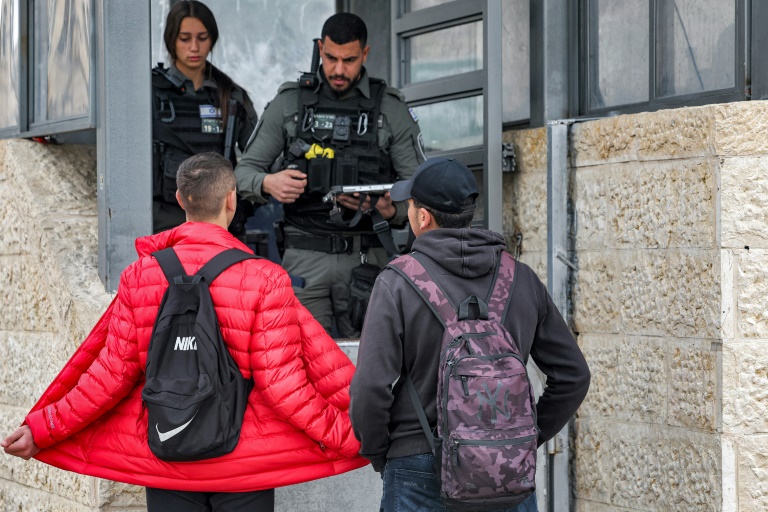Hardened and hopeless, young Palestinians commit bloody attacks

Palestinian youths present themselves to Israeli border guards during a search at the Damascus Gate of the Old City of Jerusalem, on February 23, 2023
Jerusalem – At the Damascus Gate of Jerusalem’s walled Old City, a Palestinian teenager is stopped and searched by an Israeli policeman as two other officers stand guard with rifles, before letting him go.
It is a common sight in east Jerusalem, a Palestinian area annexed by Israel following the 1967 Six-Day War, where security forces say they must be ever vigilant to thwart attacks amid a surge in violence.
In recent weeks, several bloody attacks targeting Israelis have been carried out by Palestinian teenagers armed with knives and guns.
“It is difficult to thwart the attacks by these individuals,” Israeli army spokesman Ran Kochav told public broadcaster Kan, underlining the “challenge that this represents for the intelligence services”.
“It is very difficult to know what a 13-year-old boy is thinking when he decides to carry a knife and carry out an attack, without telling anyone around him.”
On January 28, amid a surge in violence in the Israeli-occupied West Bank and the day after a deadly attack outside an east Jerusalem synagogue, a 13-year-old Palestinian shot and wounded two Israelis, a father and his son.
On February 13, a 14-year-old Palestinian boy knifed a passer-by in the Old City.
On the same day, a 13-year-old also stabbed an Israeli policeman during a security check on a bus at the entrance to east Jerusalem’s Shuafat refugee camp.
After decades of bitter conflict, such youthful Palestinian attackers are routinely condemned as “murderers” or “terrorists” on one side, and celebrated as “soldiers” or, if they are killed, “martyrs” on the other.
But experts both in Israel and the Palestinian territories are at pains to seek a more nuanced understanding on what drives them to commit such violence.
– ‘Trauma’ –
Both of the boys accused of carrying out the attacks on February 13 were Palestinians from the Shuafat refugee camp, a densely packed area of homes.
The mother of one of them, Fidaa al-Zalabani, 38, recounted how she, her husband and eldest son were all questioned by police after her son was arrested for the attack.
“They accused me of being an accomplice, of having known what my son was going to do and protecting him,” she said, recalling that she was questioned for seven hours.
“But no mother tells her son to go and stab a police officer.”
Psychiatrist Mahmoud Sehwail, based in the West Bank city of Ramallah, said that children who carry out this type of attack have often faced violence themselves.
“Behind each of these people there is a story and trauma,” said Sehwail, director of the Treatment and Rehabilitation Centre, which provides psychosocial services to survivors of violence.
Often, he said, “the ones who experience violence become violent themselves”.
Sehwail said that the root cause is the Israeli occupation of the West Bank, as well as the imposition of a blockade on Gaza since 2007 after Hamas Islamists seized control of the coastal enclave.
The Palestinian psychiatrist added that “this is what makes our children hate their children. Violence will end when the occupation ends”.
– ‘No future’ –
The youths carrying out attacks come from a generation who also grew up on violent videos posted on social media, said Michael Milshtein, specialist on Palestinian affairs at the Moshe Dayan Center for Middle Eastern and African Studies at Tel Aviv University.
“They have no future in front of them,” he said, adding that they do not feel represented by the Palestinian Authority led by 87-year-old president Mahmoud Abbas, who has spent nearly two decades in power.
Young Palestinians experience constant pressure, making them “feel helpless,” said Leah Tsemel, an Israeli lawyer with several Palestinian clients.
“They know they live under permanent occupation”, Tsemel said, adding that some children worry they could be expelled from their homes and that many have witnessed their father or a brother being arrested.
“Parents are busy providing for the needs of their families,” she said. “They do not tell their sons to go and pick up a stone and commit an attack — they all want their children to study.
“But children cannot accept this situation, so they take action.”
In Shuafat, a young activist, who asked not to be named fearing arrest, condemned the ring of security posts around the camp that separates it from the Israeli settlement of Pisgaat Zeev.
“Five minutes from here there are five parks,” he said.
“But what is there for the young people here? Nothing, there is nothing. Young people do not believe they have a future.”
